形容词的用法(基础知识)
- 格式:doc
- 大小:36.00 KB
- 文档页数:3
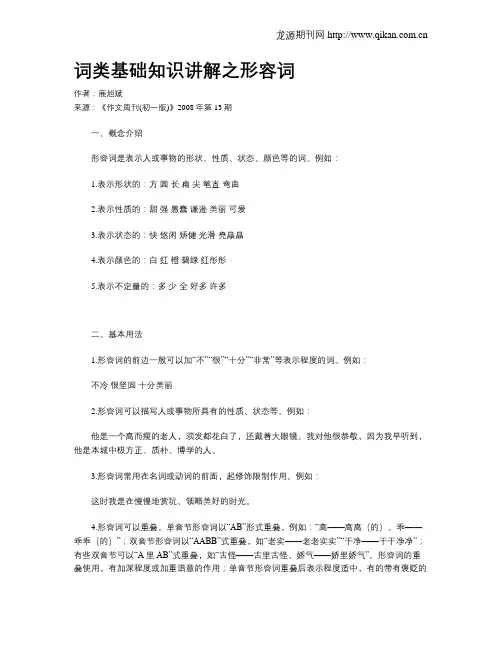
词类基础知识讲解之形容词作者:鹿旭斌来源:《作文周刊(初一版)》2008年第13期一、概念介绍形容词是表示人或事物的形状、性质、状态、颜色等的词。
例如:1.表示形状的:方圆长扁尖笔直弯曲2.表示性质的:甜强愚蠢谦逊美丽可爱3.表示状态的:快悠闲矫健光滑亮晶晶4.表示颜色的:白红橙碧绿红彤彤5.表示不定量的:多少全好多许多二、基本用法1.形容词的前边一般可以加“不”“很”“十分”“非常”等表示程度的词。
例如:不冷很坚固十分美丽2.形容词可以描写人或事物所具有的性质、状态等。
例如:他是一个高而瘦的老人,须发都花白了,还戴着大眼镜。
我对他很恭敬,因为我早听到,他是本城中极方正、质朴、博学的人。
3.形容词常用在名词或动词的前面,起修饰限制作用。
例如:这时我是在慢慢地赏玩、领略美好的时光。
4.形容词可以重叠。
单音节形容词以“AB”形式重叠,例如:“高——高高(的)、乖——乖乖(的)”;双音节形容词以“AABB”式重叠,如“老实——老老实实”“干净——干干净净”;有些双音节可以“A里AB”式重叠,如“古怪——古里古怪、娇气——娇里娇气”。
形容词的重叠使用,有加深程度或加重语意的作用;单音节形容词重叠后表示程度适中,有的带有褒贬的感情。
可以把事物的性质、状态描绘得更生动一些。
如“高高的”和“很高”,意思差不多;“安安静静”和“很安静”,意思相同;但前者带有描写性,在表达效果上显得更生动。
三、注意事项名词、动词、形容词是句子当中使用频率最高的三类词。
这三类词配合使用,构成句子的主体。
在语言运用中,要注意辨明它们的词性,掌握它们的不同用法,否则,就会出现使用不当的毛病。
1.注意名词、动词、形容词的辨别。
这三类词可用加“不”来区别:名词不受“不”修饰,不能说“不太阳”;而动词、形容词可以受“不”修饰。
如:“不能说”“不打扫”“不漂亮”。
动词、形容词可用“很”来区别:动词不能加“很”,不能说“很打扫”。
而形容词则可以加“很”,如“很漂亮”。
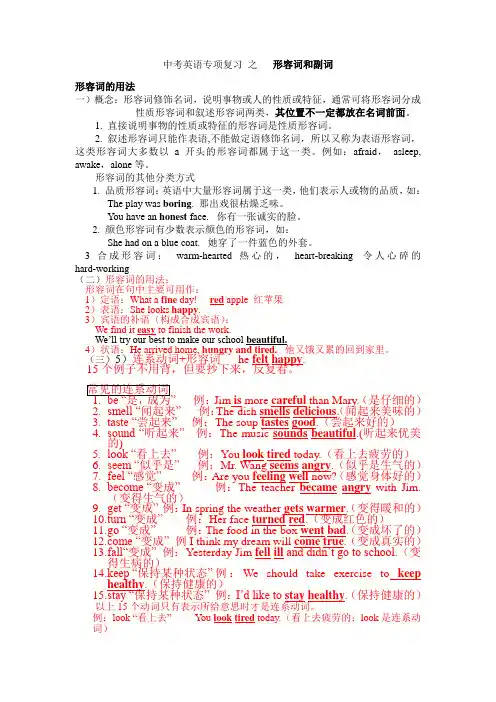
中考英语专项复习之形容词和副词形容词的用法一)概念:形容词修饰名词,说明事物或人的性质或特征,通常可将形容词分成性质形容词和叙述形容词两类,其位置不一定都放在名词前面。
1. 直接说明事物的性质或特征的形容词是性质形容词。
2. 叙述形容词只能作表语,不能做定语修饰名词,所以又称为表语形容词,这类形容词大多数以a开头的形容词都属于这一类。
例如:afraid,asleep, awake,alone等。
形容词的其他分类方式1. 品质形容词:英语中大量形容词属于这一类,他们表示人或物的品质,如:The play was boring. 那出戏很枯燥乏味。
You have an honest face. 你有一张诚实的脸。
2. 颜色形容词有少数表示颜色的形容词,如:She had on a blue coat. 她穿了一件蓝色的外套。
3 合成形容词:warm-hearted 热心的,heart-breaking 令人心碎的hard-working(二)形容词的用法:形容词在句中主要可用作:1)定语:What a fine day! red apple 红苹果2)表语:She looks happy.3)宾语的补语(构成合成宾语):We find it easy to finish the work.We’ll try our best to make our school beautiful.4)状语:He arrived home, hungry and tired.他又饿又累的回到家里。
(三)5)连系动词+形容词he felt happy.15个例子不用背,但要抄下来,反复看。
例:Jim is more careful than Mary.(是仔细的)2.smell “闻起来”例:The dish smells delicious.(闻起来美味的)3.taste “尝起来”例:The soup tastes good.(尝起来好的)4.sound “听起来”例:The music sounds beautiful.(听起来优美的)5.look “看上去”例:You look tired today.(看上去疲劳的)6.seem “似乎是”例:Mr. Wang seems angry.(似乎是生气的)7.feel “感觉”例:Are you feeling well now?(感觉身体好的)8.become “变成”例:The teacher became angry with Jim.(变得生气的)9.get “变成”例:In spring the weather gets warmer.(变得暖和的)10.t urn “变成”例:Her face turned red.(变成红色的)11.g o “变成” 例:The food in the box went bad.(变成坏了的)12.c ome “变成”例I think my dream will come true.(变成真实的)13.f all“变成”例:Yesterday Jim fell ill and didn’t go to school.(变得生病的)14.k eep “保持某种状态”例:We should take exercise to keephealthy.(保持健康的)15.s tay “保持某种状态”例:I’d like to stay healthy.(保持健康的)以上15个动词只有表示所给意思时才是连系动词。
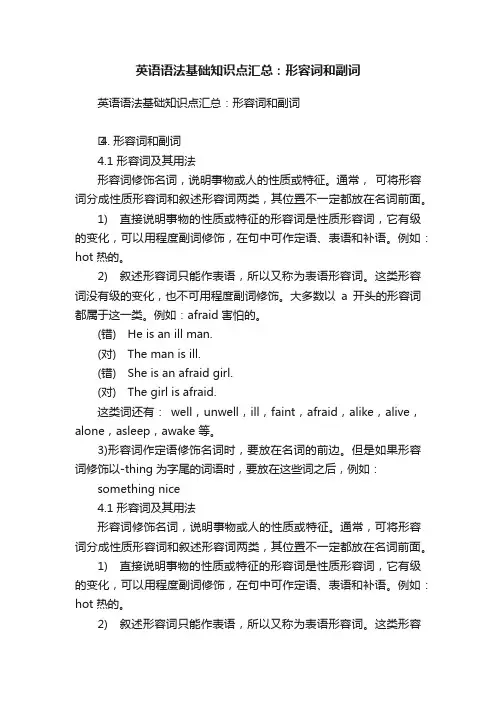
英语语法基础知识点汇总:形容词和副词英语语法基础知识点汇总:形容词和副词•4. 形容词和副词4.1 形容词及其用法形容词修饰名词,说明事物或人的性质或特征。
通常,可将形容词分成性质形容词和叙述形容词两类,其位置不一定都放在名词前面。
1) 直接说明事物的性质或特征的形容词是性质形容词,它有级的变化,可以用程度副词修饰,在句中可作定语、表语和补语。
例如:hot 热的。
2) 叙述形容词只能作表语,所以又称为表语形容词。
这类形容词没有级的变化,也不可用程度副词修饰。
大多数以a开头的形容词都属于这一类。
例如:afraid 害怕的。
(错) He is an ill man.(对) The man is ill.(错) She is an afraid girl.(对) The girl is afraid.这类词还有:well,unwell,ill,faint,afraid,alike,alive,alone,asleep,awake 等。
3)形容词作定语修饰名词时,要放在名词的前边。
但是如果形容词修饰以-thing为字尾的词语时,要放在这些词之后,例如:something nice4.1 形容词及其用法形容词修饰名词,说明事物或人的性质或特征。
通常,可将形容词分成性质形容词和叙述形容词两类,其位置不一定都放在名词前面。
1) 直接说明事物的性质或特征的形容词是性质形容词,它有级的变化,可以用程度副词修饰,在句中可作定语、表语和补语。
例如:hot 热的。
2) 叙述形容词只能作表语,所以又称为表语形容词。
这类形容词没有级的变化,也不可用程度副词修饰。
大多数以a开头的形容词都属于这一类。
例如:afraid 害怕的。
(错) He is an ill man.(对) The man is ill.(错) She is an afraid girl.(对) The girl is afraid.这类词还有:well,unwell,ill,faint,afraid,alike,alive,alone,asleep,awake 等。
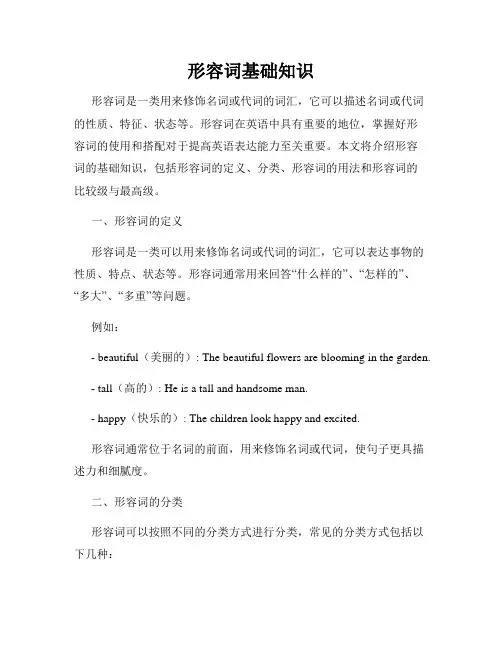
形容词基础知识形容词是一类用来修饰名词或代词的词汇,它可以描述名词或代词的性质、特征、状态等。
形容词在英语中具有重要的地位,掌握好形容词的使用和搭配对于提高英语表达能力至关重要。
本文将介绍形容词的基础知识,包括形容词的定义、分类、形容词的用法和形容词的比较级与最高级。
一、形容词的定义形容词是一类可以用来修饰名词或代词的词汇,它可以表达事物的性质、特点、状态等。
形容词通常用来回答“什么样的”、“怎样的”、“多大”、“多重”等问题。
例如:- beautiful(美丽的): The beautiful flowers are blooming in the garden.- tall(高的): He is a tall and handsome man.- happy(快乐的): The children look happy and excited.形容词通常位于名词的前面,用来修饰名词或代词,使句子更具描述力和细腻度。
二、形容词的分类形容词可以按照不同的分类方式进行分类,常见的分类方式包括以下几种:1. 基本形容词与派生形容词基本形容词是指原始的、不能再分解的形容词,例如:big(大的)、small(小的)、happy(快乐的)等。
而派生形容词是通过在基本形容词的基础上添加前缀或后缀而生成的形容词,例如:unhappy(不快乐的)、beautiful(美丽的)、patient(有耐心的)等。
2. 表示颜色的形容词颜色形容词用来描述事物的颜色,例如:red(红色的)、blue(蓝色的)、green(绿色的)等。
3. 表示大小的形容词大小形容词用来描述事物的大小,例如:big(大的)、small(小的)、tall(高的)等。
4. 表示形状的形容词形状形容词用来描述事物的形状,例如:round(圆的)、square(方的)、long(长的)等。
5. 表示性质的形容词性质形容词用来描述事物的性质特点,例如:smart(聪明的)、kind(友善的)、strong(强壮的)等。
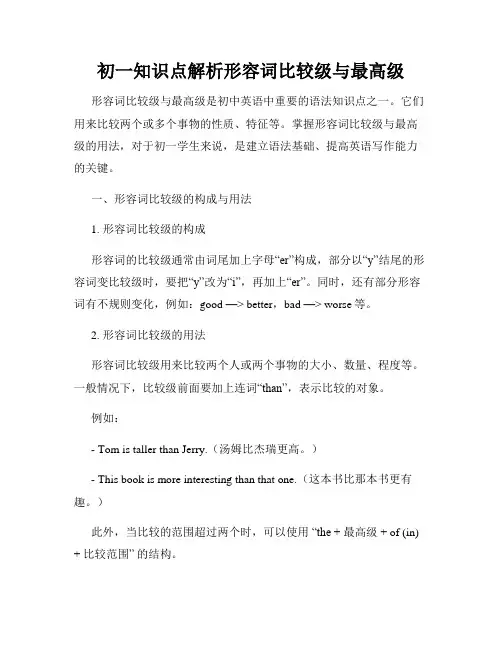
初一知识点解析形容词比较级与最高级形容词比较级与最高级是初中英语中重要的语法知识点之一。
它们用来比较两个或多个事物的性质、特征等。
掌握形容词比较级与最高级的用法,对于初一学生来说,是建立语法基础、提高英语写作能力的关键。
一、形容词比较级的构成与用法1. 形容词比较级的构成形容词的比较级通常由词尾加上字母“er”构成,部分以“y”结尾的形容词变比较级时,要把“y”改为“i”,再加上“er”。
同时,还有部分形容词有不规则变化,例如:good —> better,bad —> worse等。
2. 形容词比较级的用法形容词比较级用来比较两个人或两个事物的大小、数量、程度等。
一般情况下,比较级前面要加上连词“than”,表示比较的对象。
例如:- Tom is taller than Jerry.(汤姆比杰瑞更高。
)- This book is more interesting than that one.(这本书比那本书更有趣。
)此外,当比较的范围超过两个时,可以使用“the + 最高级 + of (in) + 比较范围” 的结构。
- Lily is the smartest of all the students in the class.(莉莉是班上最聪明的学生。
)- This is the most beautiful picture in the exhibition.(这是展览中最美的图片。
)二、形容词最高级的构成与用法1. 形容词最高级的构成形容词最高级通常由词尾加上字母“est”构成,部分以“y”结尾的形容词变最高级时,要把“y”改为“i”,再加上“est”。
同时,还有部分形容词有不规则变化,例如:good —> best,bad —> worst等。
2. 形容词最高级的用法形容词最高级用来比较三个或三个以上的人或事物的大小、数量、程度等,表示最高程度。
例如:- Mary is the tallest girl in the class.(玛丽是班上最高的女孩。
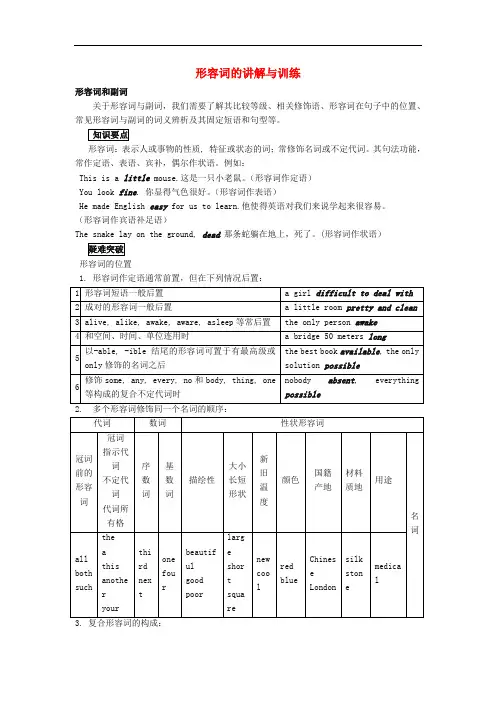
形容词的讲解与训练形容词的位置1. 形容词作定语通常前置,但在下列情况后置:副词1. 概念:是一种用来修饰动词、形容词或全句,说明时间、地点、程度、方式,表示动作特征、程度或性状等概念的词。
例如:Mary walked slowly with her boyfriend John down the river.玛丽和他的男朋友约翰沿着那条小河慢慢地向前踱着步。
(副词修饰动词,作方式状语)Although in the cold night, Xiaoming feels very warm for Liping’s care.虽然是在这寒冷的夜晚,因为李平的关心小明感到非常温暖。
(副词修饰形容词,表示程度)2. 副词种类:1. 形容词和副词的比较等级:2. 形容词和副词的基本用法:(1)形容词主要用于修饰名词,说明人或事物的性格特征。
(2)副词主要用来修饰动词,形容词,副词或其他结构。
注意以下重点句型:比较种类句型举例与……一样/ 不一样as…as…以及notso(as)…as…Tom is not so good a student as Mike is.与……一样倍数A+be+倍数+as+原级+as+BOur classroom is three times as large astheirs.The man is twice as old as the girl.……比(多/强)……倍数A+be+倍数+than+B Our classroom is five times larger thantheirs.Your age is twice older than mine.越……就越……the more…the more…The harder you work, the more progress youwill make.注意:本身表示“最高程度”的形容词/副词没有最高级和比较级。
如: extreme, perfect,favorite, excellent,extremely, perfectly, favouritely, excellently等。

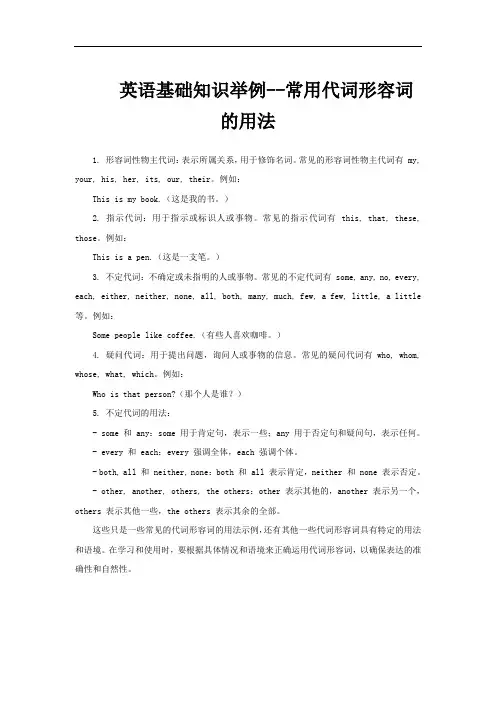
英语基础知识举例--常用代词形容词的用法1. 形容词性物主代词:表示所属关系,用于修饰名词。
常见的形容词性物主代词有 my, your, his, her, its, our, their。
例如:This is my book.(这是我的书。
)2. 指示代词:用于指示或标识人或事物。
常见的指示代词有 this, that, these, those。
例如:This is a pen.(这是一支笔。
)3. 不定代词:不确定或未指明的人或事物。
常见的不定代词有 some, any, no, every, each, either, neither, none, all, both, many, much, few, a few, little, a little 等。
例如:Some people like coffee.(有些人喜欢咖啡。
)4. 疑问代词:用于提出问题,询问人或事物的信息。
常见的疑问代词有 who, whom, whose, what, which。
例如:Who is that person?(那个人是谁?)5. 不定代词的用法:- some 和 any:some 用于肯定句,表示一些;any 用于否定句和疑问句,表示任何。
- every 和 each:every 强调全体,each 强调个体。
- both, all 和 neither, none:both 和 all 表示肯定,neither 和 none 表示否定。
- other, another, others, the others:other 表示其他的,another 表示另一个,others 表示其他一些,the others 表示其余的全部。
这些只是一些常见的代词形容词的用法示例,还有其他一些代词形容词具有特定的用法和语境。
在学习和使用时,要根据具体情况和语境来正确运用代词形容词,以确保表达的准确性和自然性。
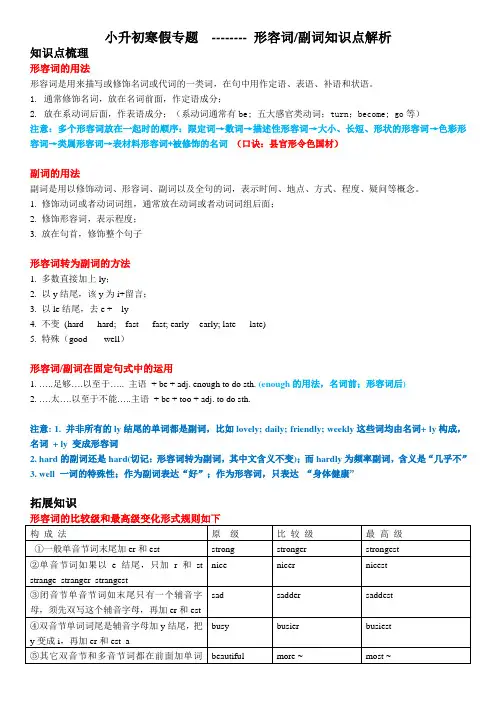
小升初寒假专题-------- 形容词/副词知识点解析知识点梳理形容词的用法形容词是用来描写或修饰名词或代词的一类词,在句中用作定语、表语、补语和状语。
1. 通常修饰名词,放在名词前面,作定语成分;2. 放在系动词后面,作表语成分;(系动词通常有be; 五大感官类动词;turn;become; go等)注意:多个形容词放在一起时的顺序:限定词→数词→描述性形容词→大小、长短、形状的形容词→色彩形容词→类属形容词→表材料形容词+被修饰的名词(口诀:县官形令色国材)副词的用法副词是用以修饰动词、形容词、副词以及全句的词,表示时间、地点、方式、程度、疑问等概念。
1. 修饰动词或者动词词组,通常放在动词或者动词词组后面;2. 修饰形容词,表示程度;3. 放在句首,修饰整个句子形容词转为副词的方法1. 多数直接加上ly;2. 以y结尾,该y为i+留言;3. 以le结尾,去e + ly4. 不变(hard --- hard; fast --- fast; early -- early; late --- late)5. 特殊(good ---- well)形容词/副词在固定句式中的运用1. …..足够….以至于….. 主语+ be + adj. enough to do sth. (enough的用法,名词前;形容词后)2. ….太….以至于不能…..主语+ be + too + adj. to do sth.注意: 1. 并非所有的ly结尾的单词都是副词,比如lovely; daily; friendly; weekly这些词均由名词+ ly构成,名词+ ly 变成形容词2. hard的副词还是hard(切记:形容词转为副词,其中文含义不变);而hardly为频率副词,含义是“几乎不”3. well 一词的特殊性;作为副词表达“好”;作为形容词,只表达“身体健康”拓展知识比较级用法(两者之间)1. 句子中有than(比)2. A or B, which is 比较级3. 有much; far; even修饰最高级用法(三者之间或三者以上)1. 句中有one of2. A, B, or C基础题练习一、写出系动词(至少6个)________________________ ________________________ ________________________ ________________________ ________________________ ________________________二、将下列形容词变为副词1. happy ________________________2. slow______________________3. careful________________________4. quick____________________5. comfortable____________________6. angry___________________7. real ________________________ 8. terrible ________________________ 9. late ________________________ 10. early ________________________ 11. good ________________________ 12. hard_________________三、选择题( )1. He looks .A. happyB. happilyC. sadly( )2. Do you feel now ? Thanks , I’m Ok.A. goodB. wellC. badly( )3. My sister is to look after herself.A. old enoughB. enough oldC. older enough( )4. There isn’t to every student.A. book enoughB. books enoughC. enough books( )5. He is ill today. So he looks .A. tiredB. happilyC. sadly( )6. My brother doesn’t feel today.A. goodB. wellC. happily( )7. The food smells . I don’t like itA. goodB. badlyC. bad( )8. He writes very .A. carefulB. carefullyC. bad( )9. I study very .A. hardB. hardlyC. careful( )10. Our country is becoming _______.A. strongB. stronglyC. richly( )11. Is there in the newspaper?A. something newB. new anythingC. anything new( )12. There is with my bike. It works well.A. nothing wrongB. wrong somethingC. something wrong( )13. He speaks for me to understand.A. too slowlyB. slowly enoughC. enough slowly( )14. He runs to catch up with me .A. too fastB. quick enoughC. quickly enough四、用恰当的词填空1. My father feels ___________ (good) today.2. _________(happy), I passed the exam.3. My father looks ____________(angry).4. My father looks ______________(angry) at me.5. She did her homework very ______________(careful).6. Lily is ____________(care). And she does everything ______________(careful).7. Don’t drive _____________(quick) on rainy days.8. They gave us a _______________(warm) welcome.9. They welcome us _____________(warm).10. The fish taste very ____________(bad).11. The flowers smell _______________(sweet).12. Your ideas sound ________________(great).13. ___________(lucky), he wasn’t badly hurt in the car crash.14. He is _____________(bad) ill.15. There are many _______________(beautiful) flowers.提高题练习一、写出以下各形容词的比较级和最高级1. nice _________ _________2. fat _____ ________3. slow _______ ___________4. dry __________ _________5. happy ________ _________6. wet ________ ____________7. much _______ _________8. ill ________ _________9. little ________ __________ 10. bad _________ _________ 11. thin __________ _________ 12. far _________ ___________ 13. early _______ _________ 14. careful_________ _________ 15. exciting _____ ___________16. busy __________ ________二、根据单词的合适形式填空1. Fred is the _________________ (short ) in his class .2. My book is ____________ ( new ) than my sister’s .3. That piece of chicken is the _________________ ( heavy )in the fridge .4. Her rule is _________________(long), and it’s the __________________(long)of ours all .5. Is a fish ____________________(thin) than a bird ?6. A rose tree isn’t __________________( short ) than a pear tree .7. The leopard can run __________________( fast), but the cheetah can run ________________( fast) than it . It can run ___________________( fast ) in the world .8. Is she the ___________________(old ) woman in the world ?9. Which is __________________( big ), a dinosaur or a blue whale ?The blue whale is ____________________( big ) than a dinosaur , it is the __________________(big) animal in the world . And elephant is the ___________________(big) animal on land .10. My father leaves home __________________(early ) than me .11. This zoo is much __________________(good ) than the old one .12. My brother is much __________________(tall ) than my cousin .13. The shoe shop is ____________________(near) the park .14. This bag is very ___________________( heavy), but that one is __________________(heavy) than this one . It’s the ___________________( heavy) of all .15. Jiamin is __________________( tall ). But Yongxian is __________________( tall ) than him .三、单选题1. Lucy is very short, but she is __________ than her sister.A. shorterB. longerC. tallerD. older2. Sam is __________ at Chinese than Jim.A. goodB. wellC. betterD. gooder3. This one is too large. Can you show me a __________one?A. largerB. largeC. smallD. smaller4. —Do you think March is __________ than January?—Yes, it’s __________ warmer.A. better, a littleB. well, muchC. worse, veryD. nicer, quite5. His Frenc h isn’t so good as __________.A. herB. sheC. hisD. hers6. Her bag is newer than __________.A. mineB. myC. meD. I7. Lin Tao is younger than __________ boy in his class.A. any othersB. any otherC. the otherD. the others8. Which one is __________, this one or that one?A. goodB. badC. bestD. worse9. The weather in North China is colder than __________ in South China.A. \B. thisC. the oneD. that10. I think your room is __________ bigger.A. a lotB. a lot ofC. lots ofD. more11. She is only 2 years old. She is ________go to school.A. too young toB. young enough toC. enough young toD. too young not to12. The room is _____ to put down these things.A. large enoughB. enough largeC. enough bigD. too large13. Do you have ______ to buy the books? --- Yes. But I am too little _____ carry them.A. enough money; toB. money enough; not toC. enough money; / D/ money enough; to14. The room is big enough ____ me to live ____.A. for; inB. to; /C. for; /D. for; on15. She is one of ____________ in our class.A. the tallest studentB. tallest studentsC. the tallest studentsD. tall students基础题练习一、写出系动词(至少6个)feel; look; taste; smell; sound; be; seem二、将下列形容词变为副词略三、选择题ABACA BCBAA CABA四、用恰当的词填空1. well2. Happily3. angry4. angrily5.carefully6. careful; carefully7. quickly8. warm9. warmly 10. bad11. sweet 12. great 13. Luckily 14. badly 15. beautiful提高题练习一、写出以下各形容词的比较级和最高级1. nicer nicest2. fatter fattest3. slower slowest4. drier driest5. happier happiest6. wetter wettest7. more most 8. worse worst 9. little less least10. worse worst 11. Thinner thinnest 12. farther farthest13. earlier earliest 14. More careful most careful15. more exciting most exciting 16. busier busiest二、根据单词的合适形式填空1. shortest2. newer3. heaviest4. longer longest5. thinner6. shorter7. fast faster fastest8. oldest9. bigger; bigger; biggest; biggest 10. earlier 11. better 12. taller 13. nearer 14. heavy; heavier; heaviest 15. tall taller三、单选题CCDAD ABBDA AAAAC。
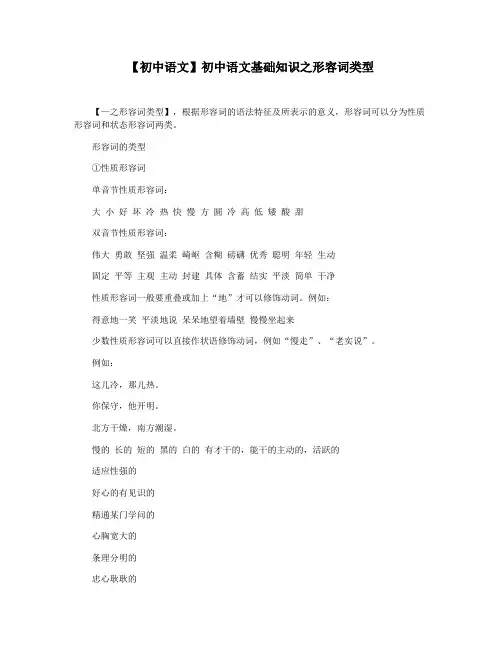
【初中语文】初中语文基础知识之形容词类型
【—之形容词类型】,根据形容词的语法特征及所表示的意义,形容词可以分为性质形容词和状态形容词两类。
形容词的类型
①性质形容词
单音节性质形容词:
大小好坏冷热快慢方圆冷高低矮酸甜
双音节性质形容词:
伟大勇敢坚强温柔崎岖含糊磅礴优秀聪明年轻生动
固定平等主观主动封建具体含蓄结实平淡简单干净
性质形容词一般要重叠或加上“地”才可以修饰动词。
例如:
得意地一笑平淡地说呆呆地望着墙壁慢慢坐起来
少数性质形容词可以直接作状语修饰动词,例如“慢走”、“老实说”。
例如:
这儿冷,那儿热。
你保守,他开明。
北方干燥,南方潮湿。
慢的长的短的黑的白的有才干的,能干的主动的,活跃的
适应性强的
好心的有见识的
精通某门学问的
心胸宽大的
条理分明的
忠心耿耿的
可信赖的负责的自觉的
无私的明白事理的
真诚的精明的生气勃勃的光明正大的塌实的、老实的、严格的
总结:性质形容词是表示性质或属性的形容词。
性质形容词作谓语时含有比较对照的意思,在句子中往往对应使用。
理解力强的有发明才能的,有创造力的正直的。
感谢您的阅读,祝您生活愉快。
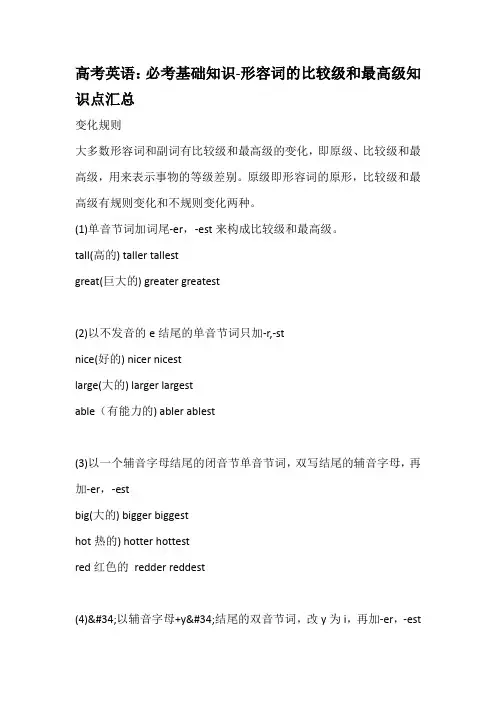
高考英语:必考基础知识-形容词的比较级和最高级知识点汇总变化规则大多数形容词和副词有比较级和最高级的变化,即原级、比较级和最高级,用来表示事物的等级差别。
原级即形容词的原形,比较级和最高级有规则变化和不规则变化两种。
(1)单音节词加词尾-er,-est来构成比较级和最高级。
tall(高的) taller tallestgreat(巨大的) greater greatest(2)以不发音的e结尾的单音节词只加-r,-stnice(好的) nicer nicestlarge(大的) larger largestable(有能力的) abler ablest(3)以一个辅音字母结尾的闭音节单音节词,双写结尾的辅音字母,再加-er,-estbig(大的) bigger biggesthot热的) hotter hottestred红色的redder reddest(4)"以辅音字母+y"结尾的双音节词,改y为i,再加-er,-esteasy(容易的) easier easiestbusy(忙的) busier busiest(5)以ly结尾的副词,除early-earlier-earliest,其他都是加more most. Slowly-more slowly-most slowlyBravely-more bravely-most bravelyquickly-more quickly-most quickly(6)少数以-er,-ow结尾的双音节词未尾加-er,-estclever(聪明的) cleverer cleverestnarrow(窄的) narrower narrowest(7)其他双音节词和多音节词在前面加more,most来构成比较级和最高级。
如:important(重要的) more important most importanteasily(容易地) more easily most easily(8)一些词的比较级和最高级,可以加-er或-est,也可以加more或most如:clever, polite等。
中考英语词汇之形容词和副词形容词和副词在英语中是非常重要的词类,它们可以用来描述人、事物的性质、状态以及描述动作的方式。
掌握形容词和副词的用法和意义,对于中考英语的考试非常关键。
本文将详细介绍中考英语中形容词和副词的基本知识点。
一、形容词(Adjectives)形容词是用来描述、修饰名词或代词的词类。
它可以描述一个事物的特征、性质、数量或状态。
形容词在句子中通常位于名词之前,用以补充说明名词的特征。
1. 形容词的位置形容词通常放在名词之前,作为名词的修饰语。
例如:- a beautiful flower(一个漂亮的花)- an interesting book(一本有趣的书)2. 形容词的比较级和最高级形容词有原级、比较级和最高级三种形式。
比较级用于比较两个人或物之间的差异,最高级用于比较三个或三个以上人或物之间的差异。
形容词的比较级的构成规则如下:- 单音节形容词和部分双音节形容词在词尾加-er构成比较级,加-est 构成最高级。
例如:- small(小的)- smaller(更小的)- smallest(最小的)- tall(高的)- taller(更高的)- tallest(最高的)- 以字母“e”结尾的形容词,在词尾加-r构成比较级,加-st构成最高级。
例如:- brave(勇敢的)- braver(更勇敢的)- bravest(最勇敢的)- 以辅音字母+y结尾的形容词,将y变为i,再加-er构成比较级,加-est构成最高级。
例如:- happy(幸福的)- happier(更幸福的)- happiest(最幸福的)形容词的最高级的构成规则如下:- 单音节和部分双音节形容词在词尾加-est构成最高级。
- 大部分双音节或多音节形容词在前面加most构成最高级。
3. 常见形容词的用法形容词可以用于修饰人物、事物的外貌、特征、品质等。
例如:- beautiful(漂亮的),表示外貌美丽。
例如:a beautiful girl(一个漂亮的女孩)- tall(高的),表示身材高大。
初中英语基础知识专题复习:形容词副词一考点形容词的用法,副词的用法,形容词、副词比较等级二知识点:一)、形容词的用法1、形容词+名词a beautiful girl2、连系动词(be, look, feel, taste,sound,smell, get, turn等)+形容词Your mother looks happy today3、something,anything等不定代词+形容词I can’t see_____________ (其他的东西)4、the+形容词(表示一类人或物)The rich should help the poor二)、副词用法1、动词+副词动词后如有宾语,副词放在宾语后面She speaks English ___.(well, good)2、quite a + 形容词+ 名词a + very / rather +形容词+名词一个相当不错的女孩quite a good girla very / rather good girl3、形容词/副词+enough、enough+名词Don’t worry, we have enough time4、good & wellgood(形容词)well(副词) 只有表身体好才用作形容词5 too, either & also “也”too(肯定,句末),either(否定,句末)also(句中)三)、形容词变副词1、一般加-lycareful-- carefullyslow----slowly2、辅音字母加-y结尾,变y为i再加-lyhappy--happily heavy--heavily3、-ly结尾,但为形容词的词lovely, lively, lonely, friendly四)、比较等级1、加比较级(-er)、最高级(-est)的规则(看书P27)2 。
部分双音节和多音节词,在前面加more,most形容词+ly变来的词,加more, most单词本身拼写以ly结尾的,变y为i再加-er,-estslowly—more slowly most slowlyearly—earlier earliestclever—cleverer cleverest3.不规则变化good, well -------- better-----bestbad, badly, ill ------ worse--------worstmany, much------- more-------mostlittle -------- less------leastfarther farthest表“距离”farfar further furthest表“程度”oldolder oldest年龄大小elder eldest只做定语, 仅用于兄、姐4、形容词最高级前要加the, 副词最高级前可加可不加thethe tallest (the) fastest5、下面的词可修饰比较级,其他的不可以。
高三英语形容词的复习教案。
一、基础用法1.形容词的定义:表示人、事、物的性质、状态和特征的词语。
例如:big、small、happy、sad、busy等。
2.形容词的用途:(1)修饰名词:He is a tall man. (形容词tall修饰名词man)(2)作表语:She is beautiful. (形容词beautiful作表语,表示主语She的性质)(3)作定语:I met an old man on the street. (形容词old作定语,修饰名词man)(4)作状语:He ran fast. (形容词fast作状语,修饰动词ran)二、高级用法1.形容词的比较级和最高级(1)比较级:表示两个人或物之间的比较,形式是在形容词前添加-er或在前面加more。
例如:tall → taller; interesting → more interesting。
(2)最高级:表示三个或以上人或物之间的比较,形式是在形容词前加the前缀或在前面加most。
例如:tall → the tallest; interesting → the most interesting。
2.形容词的原级、派生形式和副词形式(1)原级:形容词最基本的形式,不带任何词尾,例如:tall、happy、big等。
(2)派生形式:通过在原级后加后缀形成的形容词,例如:tall → taller、tallest;happy → happier、happiest。
(3)副词形式:通过在原级后加-ly形成的副词,例如:tall → tallly;happy → happily。
三、教学重点难点1.比较级和最高级的应用:学生需要注意形容词比较级和最高级在句子中的应用和用法。
2.派生形式和副词形式的认知:学生需要通过课前给出的练习来加深对形容词派生形式和副词形式的认知。
四、教学策略与方法1.双向互动式教学方法:在讲解完相应的知识点后,老师可以放慢节奏,逐一让学生回答相应的问题,增强课堂的互动性和参与性。
专题二: 形容词、副词、比较等级基础知识过关一、形容词及其基本用法形容词用来修饰名词或代词, 说明其性质或特征。
形容词一般可以作定语、表语和补足语, 有时也可作状语, 但有些形容词只能作表语, 如well, ill, faint, pleased以及多数以“a”开头的形容词(afraid, alike, alive, alone, asleep, awake等)。
二、形容词的一些注意事项(1)形容词作定语修饰名词时, 要放在名词的前面。
但是如果形容词修饰不定代词时, 要放在不定代词之后, 如something nice。
Unlike traditional gyms, this one offers people free choices to exercise.这个健身房不像传统的健身房, 它为人们提供灵活的锻炼选择。
(2)以-ly结尾的形容词大部分形容词加-ly可构成副词, 但friendly, deadly, lonely, likely, lively, lovely仍为形容词。
有些以-ly 结尾的词既为形容词, 也为副词, 如daily, weekly, monthly, yearly, early等。
(3)“the+形容词”表示类别和整体“the+某些形容词”可以泛指一类, “the+国家和民族的形容词”指这个民族的整体, 与谓语动词的复数连用, 如the dead, the living, the rich, the poor, the blind, the hungry, the British, the English, the French, the Chinese等。
三、副词的基本用法(1)副词主要用来修饰动词、形容词、副词或整个句子, 疑问副词是用来表达疑问或构成疑问句的。
A dog’s eating habit requires regular training before it is properly established.狗的饮食习惯在正确地养成之前需要定期训练。
汉语中形容词的特殊用法
汉语中形容词的特殊用法包括以下几种:
1. 形容词可以作定语或表语
形容词可以修饰名词,如:蓝色的天空、美丽的花朵。
也可以作为表语,如:这个问题很困难、那个人很聪明。
在这种用法下,形容词一般不需要加助词。
2. 形容词可以作状语
形容词可以修饰动词、副词或整个句子,表示程度、方式或状态,如:他跑得很快、她说话声音很大、我感到很幸福。
3. 形容词可以作补语
形容词可以作及物动词或使役动词的补语,表示主语的状态或特征,如:他把房间收拾得干净利落、她把衣服洗得干干净净。
4. 形容词可以用作程度副词
某些形容词可以用作程度副词,表示程度,如:很好、非常美丽、特别高兴。
5. 形容词可以用作谓语
某些形容词可以直接用作谓语,表示主语的状态或特征,如:他累了、天晴了、水干了。
需要注意的是,汉语中形容词没有性、数和格的变化,也不需要与名词或代词保持一致。
而且,在汉语中,形容词的位置是
可以灵活变动的,可以放在名词前、后或句子的其他位置。
形容词的特殊用法要根据具体的语境进行理解和运用。
幼教小班语文教案:认识形容词的用法一、教学目标:1、能够听懂、理解,认真观察形容词的运用情况。
2、掌握形容词的基本定义,能够运用基本形容词进行简单的描述。
3、注重培养学生的观察力和语言表达能力,能够用语言或图画等形式表达所学到的知识。
二、教学内容:观察语言中形容词的用法,认识形容词,初步学习形容词的分类和用法。
三、教学重点:1、形容词的基本定义。
2、形容词的分类和基本用法。
四、教学难点:初步区分和运用形容词。
五、学法指导:1、培养孩子的观察力。
教育孩子学会观察事物是很重要的。
告诉孩子们在生活中随时发现美好、领悟到美好的语言和心情,用语言表达出来是一种很有营养的活动。
2、积极亲近词汇,为词汇知识的扩展打下基础,加强孩子们的语言感受能力。
六、教学过程:1、提问:同学们,今天我们要学习怎样叫做形容词呢?2、导入:请大家注意听下面每一句话中出现了哪些用来修饰名词的词?3、整理:同学们说出听到的词。
4、探究:老师呈现一些物品,让同学们用眼、用心进行观察和描绘。
例如:可爱的小熊;矮胖的青蛙;漂亮的花儿等。
5、提供范例:老师再次上述的物品进行描述,并给出形容词搭配的范例。
例如:这个小熊(可爱);这只青蛙(矮胖);那朵花儿(漂亮)。
6、学习:同学们整理好笔记,并开始学习形容词的基本定义。
7、看图考察:将一些形象的图画呈现给同学们,让他们在图画中认知和找出各种形容词。
例如:这只青蛙(大、高、矮、胖、瘦);这个小鸟(美丽、可爱、灵活、聪明)等。
8、轻松地操作词语:让同学们积极地运用所学词汇进行练习,进一步强化他们的词汇运用技巧。
例如:抓住老鼠的猫咪;吃草的绵羊;黑色的粉笔等。
9、游戏互动:进行形容词小游戏,例如:快速使用五个形容词描述手中拿的物品等。
七、课堂小结:通过本次教学,我们学习到了形容词的基本概念,掌握了形容词的分类和基本用法,经过观察、认知、练习,孩子们的语言能力得到较好地发展。
下一步,老师将带领大家再次进行个性化教学,还将对形容词的更复杂运用进行深入探究和学习。
形容词的用法【真题再现】1. —Which city has _________population, Beijing, Guiyang or Xingyi? 【2012黔西南】—Xingyi, of course.A. the largestB. the smallestC. the mostD. the least2. —Henry, you ______ tell the teacher if you want to go out of the classroom.—Sorry, sir. 【2012贵州贵阳】A. are supposed toB. are surprised toC. are afraid to3. —You are relaxing yourself here? 【2012安徽省】—Yes. It feels to walk slowly along the river.A. fantasticB. boringC. strangeD. terrible4. I work hard this term, but Peter works much _______.【2012北京】A. hardB. harderC. hardestD. the hardest5. —Peter is _______ than you, right? 【2012广西玉林】—Yes, but he is _______ runner in our class.A. heavier; bestB. heavy; the bestC. heavier; the bestD. heavy; better6.His grandparents live _______ in a small house, but they don’t feel ________.【2012贵州安顺】A.lonely; alone B.alone; lonely C.lonely; lonely D.alone; alone7.The_______you work at your lessons, the _______ results you will get. 【2012 湖北黄石】A. hard; goodB. harder; goodC. hard; betterD. harder; better8 — Do you know sound travels very fast? 【2012湖北荆州】— Yes. But light travels sound.A. as fast asB. a little faster thanC. much faster thanD. slower than【答案与解析】1. A。
修饰population只能用large/big或small,由句意可知“问最少人口的地方是哪个?”,所以用large的最高级largest。
2. A。
be supposed to do sth 意为“应该做某事”。
3. A。
本题考查形容词作表语的用法。
fantastic意为“好极了”。
4. B。
考查副词hard的比较级和最高级,由于much可以修饰比较级,所以选项B正确。
5. C。
考查形容词的比较级和最高级,由than可知第一空用形容词比较级,由in our class 这个整体范围可知第二空用形容词最高级。
6. B。
句意为“他的祖父母住在一偏僻的小房子里,但是他们不感到孤独”。
alone意为“单独的”,lonely意为“孤独的”。
7. D。
本题考查句式“the+接形容词或副词比较级,the+接形容词或副词比较级”,意为“越……;越……”。
8. C。
第二句句意为“光旅行的速度比声音快多了”。
much修饰形容词比较级,强调程度。
【用法讲解】考试要求:形容词的中考要求是:形容词的基本用法,形容词的比较级和最高级;某些特殊变化的形容词的比较级和最高级(good-better-best等);形容词的同级比较(as/ so ... as...的用法);形容词比较级的叠加句型(…more and more beautiful)等。
1. 形容词的知识点:形容词是用来形容和修饰名词的一类词。
大多数形容词具有比较级,形容词的位置一般在其修饰的名词前面。
形容词在句子中一般可以作定语、表语和宾语补足语等。
如:I want to buy a green sweater. 我想买一件绿色的毛衣。
(定语)Our headmaster is ill again.我们的校长又生病了。
(表语)My dog’s death made me very sad. (宾语补足语)形容词的种类一般有:(1) 简单的形容词有:good 好的,green 绿色的,long 长的,bright 明亮的(2) 带有前缀a-的形容词:afraid 害怕的,alike 相同的,asleep 睡着的(3) 由动词的分词构成的形容词:interesting 有兴趣的,exciting 令人兴奋的;tired 疲劳的;spoiled 宠坏的(4) 复合形容词:数词+名词+形容词,如:five-year-old五岁的;名词+现在分词,如:heart-breaking 令人伤心的;形容词+现在分词,如:good-looking 英俊的。
2. 形容词的比较等级:形容词一般有三个等级,即原级、比较级和最高级。
一般来说,表示两者同等或不同等程度时用原级,通常用“as + 形容词原级+ as ...”或“not as (so)+ 形容词原级+ as ...”的结构。
如:My brother is as tall as I. 我弟弟和我一样高。
The weather in Beijing is not so hot as that in Wuhan. 北京没有武汉热。
表示两者的比较时用比较级,通常用“形容词比较级+than”的结构。
如:I am much better than I was yesterday. 我比昨天好多了。
Math is less interesting than English. 数学不如英语有兴趣。
表示一定范围内两者以上的比较时,用最高级,通常用“the + 形容词最高级(+名词)+ of (in) ...”的结构。
如:This is the busiest day of the week. 这是我本周最繁忙的一天。
3. 形容词的比较级和最高级的变化规则:规则变化:(1) 单音节词直接在其后面加-er/-est。
如:tall-taller-tallest(2) 以字母e结尾的单音节词在其后面直接加-r/-st。
例如:brave-braver-bravest。
(3) 以一个辅音字母结尾的重读闭音节,要双写这个辅音字母再加-er/-est。
如:big-bigger-biggest;hot-hotter-hottest。
(4) 以辅音字母+y结尾的双音节词,先把y改为i,再加-er/-est。
如:happy-happier-happiest。
(5) 其他双音节词和多音节的词,在前面加more和most。
如:interesting-more interesting-most interesting不规则变化:good-better-best bad/ill-worse-worst many/much-more-mostlittle-less-least far-farther-farthest4. 形容词的比较级的其他用法:(1) 两者相比表示倍数的时候用twice (...times) as+原级+as结构。
如:His mistakes are twice as many as yours in the homework.他家庭作业的错误是你的二倍。
(2) 比较级前面可以用many,much,far,a little,a bit,a lot等词修饰表示程度。
如:The sun is much bigger than the earth. 太阳比地球大多了。
(3) 比较级的前面可以用any和no来修饰。
如:We were too tired to walk any farther. 我们太疲劳了不能再走很远了。
He was no longer a child. 他不再是一个小孩子。
(4) 两个形容词的比较级可以叠加表示“越来越”的意思。
其结构可以是:比较级+and+比较级,而多音节词可以用more and more+比较级结构。
如:The days are getting longer and longer. 天正变得越来越长了。
Your sister becomes more and more beautiful. 你的妹妹变得越来越漂亮了。
(5) 当比较的双方属于同一范围内时候,用other或者else排除自己,因为自己不能和自己比较。
如:Shanghai is bigger than any other city in China. 上海比中国其他的城市大。
如果比较的双方不属于同一范围内时候,则不存在和自己比较的情况,所以可以不用other 或者else。
如:Shanghai is bigger than any city in Heilongjiang. 上海比黑龙江的任何城市都大。